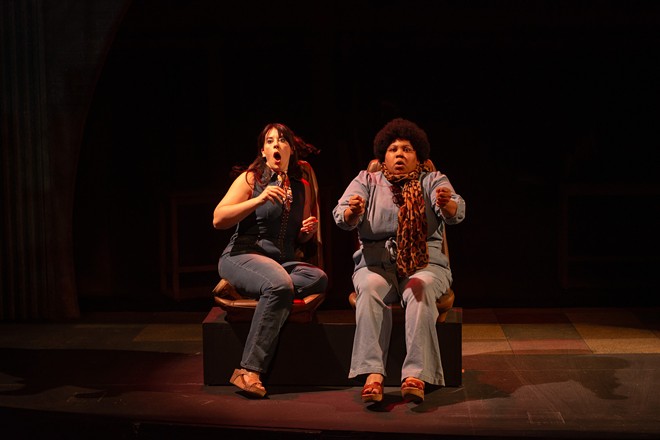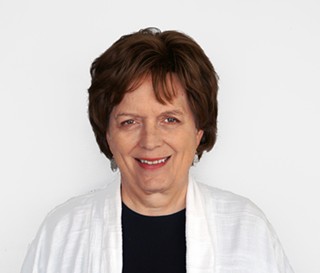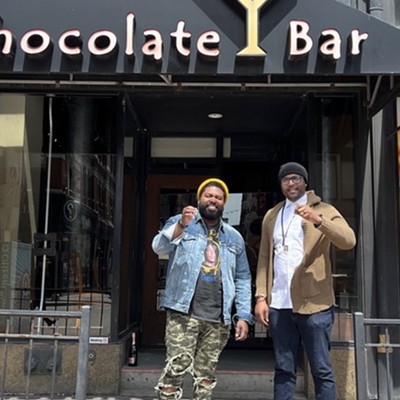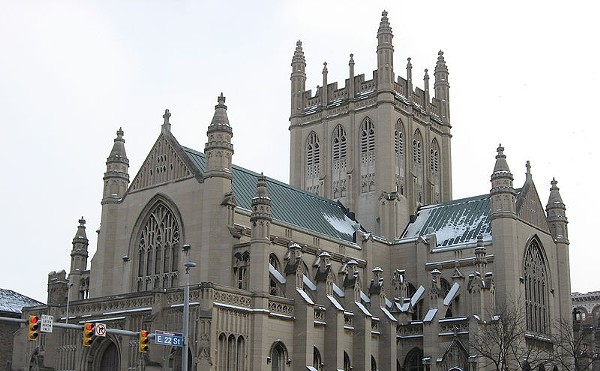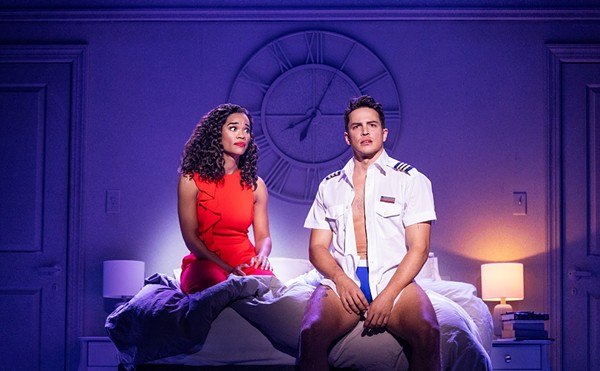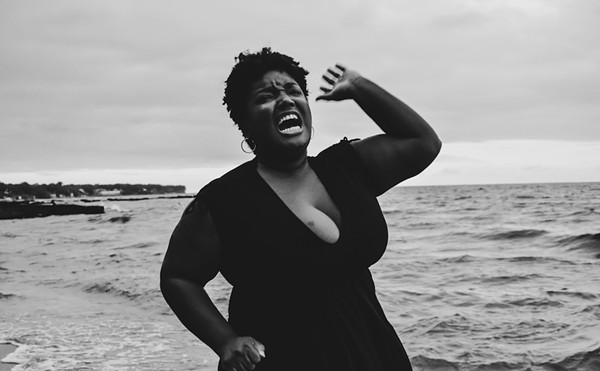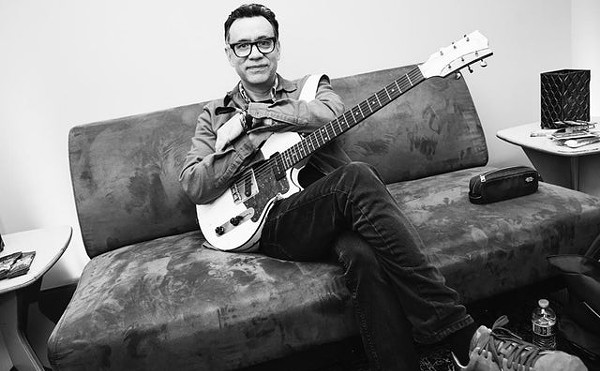Set in 1970s Cleveland, 'Breakfast at the Bookstore,' Now at Karamu, is a Powerful Work on Black Residents' Fight for Freedom
Amid the turmoil of the Civil Rights era and the Glenville riots, the characters look for sustenance of all kinds
By Christine Howey on Mon, Jan 29, 2024 at 10:18 am
[
{
"name": "Ad - NativeInline - Injected",
"component": "38482495",
"insertPoint": "3",
"requiredCountToDisplay": "5"
},{
"name": "Real 1 Player (r2) - Inline",
"component": "38482494",
"insertPoint": "2/3",
"requiredCountToDisplay": "9"
}
]
Sometimes, the title of a play can be loaded with more import than it seems at first. The title of Lisa Langford's new work, now receiving its world premiere at Karamu House, is both complex and fascinating. And its seemingly placid title, The Breakfast at the Bookstore, carries a powerful message about the ways people in Cleveland's Black community were seeking sustenance—physically, mentally and spiritually—back in the late 1960s and early 1970s.
This production directed by Nina Domingue paints an indelible picture of the pressures on Black people here in our town after the world kind of exploded in 1968. That year, Martin Luther King, Jr. and Robert F. Kennedy were assassinated, two Black athletes staged a silent gloved-fist protest at the Summer Olympics, and the Black Power (Black Liberation) Movement began to gain traction throughout the country.
Also that year, the Glenville Riots were sparked by a shootout between Cleveland police and the Black Nationalists of New Libya, a tragic event that left seven dead and many more wounded.
Flash forward five years and the residents of Glenville were still vibrating from the shocks of the Riots, and the need to find hope was palpable in the community. That is when Langford's play begins as an older man, a former Black Nationalist named Sharpe and his common-law wife Dot contemplate opening a storefront business. She wants to open a bookstore and is entranced with the idea of having a weekly "free breakfast" for the children in the neighborhood. Sharpe is unimpressed with that idea and instead wants to have a store selling miscellaneous but necessary items such as toasters and irons.
But their diverging dreams don't start and end at the curb of their empty storefront. Sharpe tells Dot and his go-fer pal Haywood that he has visited "spacemen" who took him up to their spaceship and shared knowledge with him. This is delivered and accepted as completely natural by the others, and in short order Haywood also claims to have been visited by the aliens.
This layer of Langford's script echoes the spiritual nature of some who at that time were exploring the compositions of Sun Ra, an avant-garde jazz musician who linked the African-American experience to ancient Egyptian mythology and outer space.
Dot, who sees herself as a budding freedom fighter, is a young woman open to all aspects of liberation, including sex. Portrayed at this opening performance by Mariah Burks, (and soon thereafter by the actress named Kechanté), Dot is a warm and endearing presence to which others are drawn. As she says, "I got all this love and nowhere to put it." It is her journey, both earthbound and mystical, that forms the core of Breakfast.
Dialog scenes are interspersed with monologs directed at the audience as 1973 rolls on and other mysteries abound. No one seems to know where Sharpe (the fine veteran Karamu actor Prophet Seay) gets his money as he swerves from spouting militant dogma to going on binge drunks in between his capitalist ventures. Haywood (an excellent Dar'Jon Bentley) gently pursues Dot with her full cooperation, and even the local white mail carrier Fran (Carolyn Demanelis) has her moment of transformation.
Laura Carlson-Tarantowski's handsome storefront scenic design features floor-to-ceiling windows that allow for a celestial glow to wash over the folks now and then. But a faux proscenium arch that is used as a screen for T. Paul Lowry's digital media projections is a mixed bag. At times it is stunning, as when the arch and windows are flooded with butterflies. But when the arch alone is used as a screen there is not enough space for the images, making a scene when Dot and Fran are driving in a car look like they're spinning through streets in a Tilt-A-Whirl from Euclid Beach Park.
The Breakfast at the Bookstore is all about the search for freedom, either the cosmic or quotidian, and the riches, as well as the wages, that such a search can deliver.
The Breakfast at the Bookstore
Through February 18 at Karamu House, 2355 E. 89 St., karamuhouse.org, 216-795-7070.
Subscribe to Cleveland Scene newsletters.
Follow us: Apple News | Google News | NewsBreak | Reddit | Instagram | Facebook | Twitter | Or sign up for our RSS Feed
This production directed by Nina Domingue paints an indelible picture of the pressures on Black people here in our town after the world kind of exploded in 1968. That year, Martin Luther King, Jr. and Robert F. Kennedy were assassinated, two Black athletes staged a silent gloved-fist protest at the Summer Olympics, and the Black Power (Black Liberation) Movement began to gain traction throughout the country.
Also that year, the Glenville Riots were sparked by a shootout between Cleveland police and the Black Nationalists of New Libya, a tragic event that left seven dead and many more wounded.
Flash forward five years and the residents of Glenville were still vibrating from the shocks of the Riots, and the need to find hope was palpable in the community. That is when Langford's play begins as an older man, a former Black Nationalist named Sharpe and his common-law wife Dot contemplate opening a storefront business. She wants to open a bookstore and is entranced with the idea of having a weekly "free breakfast" for the children in the neighborhood. Sharpe is unimpressed with that idea and instead wants to have a store selling miscellaneous but necessary items such as toasters and irons.
But their diverging dreams don't start and end at the curb of their empty storefront. Sharpe tells Dot and his go-fer pal Haywood that he has visited "spacemen" who took him up to their spaceship and shared knowledge with him. This is delivered and accepted as completely natural by the others, and in short order Haywood also claims to have been visited by the aliens.
This layer of Langford's script echoes the spiritual nature of some who at that time were exploring the compositions of Sun Ra, an avant-garde jazz musician who linked the African-American experience to ancient Egyptian mythology and outer space.
Dot, who sees herself as a budding freedom fighter, is a young woman open to all aspects of liberation, including sex. Portrayed at this opening performance by Mariah Burks, (and soon thereafter by the actress named Kechanté), Dot is a warm and endearing presence to which others are drawn. As she says, "I got all this love and nowhere to put it." It is her journey, both earthbound and mystical, that forms the core of Breakfast.
Dialog scenes are interspersed with monologs directed at the audience as 1973 rolls on and other mysteries abound. No one seems to know where Sharpe (the fine veteran Karamu actor Prophet Seay) gets his money as he swerves from spouting militant dogma to going on binge drunks in between his capitalist ventures. Haywood (an excellent Dar'Jon Bentley) gently pursues Dot with her full cooperation, and even the local white mail carrier Fran (Carolyn Demanelis) has her moment of transformation.
Laura Carlson-Tarantowski's handsome storefront scenic design features floor-to-ceiling windows that allow for a celestial glow to wash over the folks now and then. But a faux proscenium arch that is used as a screen for T. Paul Lowry's digital media projections is a mixed bag. At times it is stunning, as when the arch and windows are flooded with butterflies. But when the arch alone is used as a screen there is not enough space for the images, making a scene when Dot and Fran are driving in a car look like they're spinning through streets in a Tilt-A-Whirl from Euclid Beach Park.
The Breakfast at the Bookstore is all about the search for freedom, either the cosmic or quotidian, and the riches, as well as the wages, that such a search can deliver.
The Breakfast at the Bookstore
Through February 18 at Karamu House, 2355 E. 89 St., karamuhouse.org, 216-795-7070.
Subscribe to Cleveland Scene newsletters.
Follow us: Apple News | Google News | NewsBreak | Reddit | Instagram | Facebook | Twitter | Or sign up for our RSS Feed
SCENE Supporters make it possible to tell the Cleveland stories you won’t find elsewhere.
Become a supporter today.
About The Author
Christine Howey
Christine Howey has been reviewing theater since 1997, first at Cleveland Free Times and then for other publications including City Pages in Minneapolis, MN and The Plain Dealer. Her blog, Rave and Pan, also features her play reviews. Christine is a former stage actor and director, primarily at Dobama Theatre...
Scroll to read more Arts Stories & Interviews articles
Newsletters
Join Cleveland Scene Newsletters
Subscribe now to get the latest news delivered right to your inbox.

